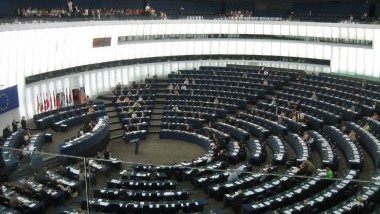But what if the European dream came true and we had transnational lists? Who would run, how, and who would end up being elected? These questions have not been asked very often, but the closer we get to an EU-wide constituency, the more relevant they will become. Accordingly, I have penned two articles to consider the matter.
“European faces” are valuable but scarce
What kind of candidates are put forward by European parties may depend on the size of the party lists. For the purpose of this consideration, let us assume that the maximum number of candidates representing one party list shall not exceed the number of candidates to be elected from the constituency.
Logically, those who are best placed to be elected standing on a transnational list specifically, should stand on such a list. For a nationally well-known politician, the easiest pathway to the European Parliament would remain the traditional national or regional constituency. Take an example from the European Greens (who favour transnational lists): Pekka Haavisto, the runner-up of the 2012 Finnish presidential election, might be a suitable Finn for the Greens’ European list, but if he wished to become an MEP, surely it would be easier for him to get elected through the Finnish constituency. Those who are known across Europe, rather than just being known in their home country, have a natural advantage in transnational lists and are more likely to be elected. Indeed, these distinctively European figures should logically stand as a part of a transnational party list.
If the moderate idea of a 25-member constituency, proposed by Andrew Duff in the European Parliament, were adopted, there might just be enough “European faces” to fill the European seats in the Parliament. Even here, though, there would be trouble for parties when it comes to the nomination of candidates. Few passionate pro-Europeans, let alone ordinary citizens, could easily name 25 Green politicians. And as illustrated above, even of those whom you could name, not everyone would be a perfect fit for transnational lists. Ska Keller could stand in the European constituency, but who would the other 24 be?
If the size of the constituency was 73 as opposed to 25, a somewhat large number of unknown politicians would be bound to not just stand, but also win a seat. Regardless of the size of the constituency, however, assuming that parties don’t want their best talent to risk being left out, all parties would have to put forward at least some relatively unknown candidates.
Who puts the “transnational” in transnational lists?
The question of “European faces” aside, plenty of other questions remain to be considered. For one thing, how inclined would voters be to vote for a “European” candidate from a country other than their own? In this regard, the value of transnational lists may increase over time. Initially it might be that voters prefer their compatriots if politically feasible. However, as the public gets more accustomed to the idea of being represented politically by a ‘foreigner’ (yet fellow EU citizen!), the “transnational” in “transnational lists”, little by little, becomes more apparent.
In this context, it is relevant to consider whether the election would take place in an open, semi-open or closed list system. If the order of candidates was predetermined by each Europarty, equal geographic representation could be guaranteed. On the other hand, power games reminiscent of appointments to the top posts of the EU might take hold, sparking controversy and ire within party organisations. An open or semi-open list would, by definition, better allow the public to genuinely decide whom to choose. In any case, a relatively even geographical distribution of candidates can be expected to win votes. At the very least, uncomfortable questions would likely be raised if a party had several German candidates standing but none from Southeast Europe.
The issue of what ought to be called ‘nationalism’, potentially influencing voting behaviour, brings us to the bias towards big Member States that might be built in the system. If everyone just votes for candidates from their countries, it will be the French, the Germans and the Italians who get the European seats. Here, one should note that lead figures of party groups in the European Parliament (read: “European faces”) have tended to be from the Inner Six, and big Member States like the UK and Spain. Politicians from big Member States would therefore have a double advantage in the European constituency.
Before one laments the dominance of the big and the powerful in the European Parliament, one should note that in its present state the Parliament doesn’t represent the principle of “one man, one vote”, like the chamber of the European people arguably should. Transnational lists do. One could say that if transnational lists strengthen the big Member States in the Parliament, so be it. It would be a democratic choice made by the people, and at present it is the big member states that suffer from the distortion of the “one man, one vote” principle.
Contacted by email about nationally-based “European” campaigns, Andrew Duff retorted that “nobody will get elected from a transnational list if they fight a uniquely national campaign”. Perhaps for the geographically more fortunate (like those from the densely inhabited Western Germany), campaigning further from home would be necessary, but for an aspiring European politician from Timișoara, Romania, it’s even more of a sine qua non.
Public attitudes are key in defining the degree of the transnational element in the EU-wide constituency but candidates can change these attitudes. A candidate with political competence, an engaging presence on social media, and confidence in making public appearances in foreign countries and foreign languages should win over supporters from across national borders. A Europarty would be ill-advised not to place an internet-savvy polyglot on its list of candidates if given the chance.
The more there will be inspiring figures like these springing forward thanks to transnational lists, the more the public will sympathise with the system. And remember: the relative lack of well-known distinctively European politicians dictates that there are bound to be unknown or up-and-coming candidates standing. The Europe-wide constituency can make for truly exhilarating stories. Would it not be great for the legitimacy of the European Parliament as the representative of European people, as well as for the public image of the party groups represented by these candidates, if MEPs who rose to prominence like this were rewarded with influential positions within the Parliament?
In the next part, we’ll discuss campaigning on transnational lists in more detail. It will be published later in the week.




Follow the comments: |
|
